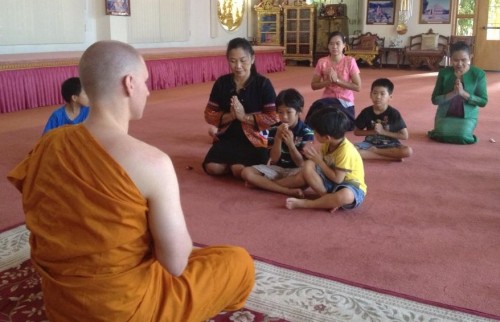How to Become a Thai Monk: 227 Rules, part 3 Posted by palmisano on Oct 3, 2013 in Culture
image: These children were born in the US, so they identified with me better than the Thai monks. We are between two very different worlds.
[This article is a continuation of a series of articles on becoming a Thai Buddhist monk.]
I really tried to be a good monk by reading and following all the rules. But, it turned out many of the rules are really strange and the monks simply ignored/violated them. Let me explain . . .
Many of the rules make sense, like do not kill, lie, steal, etc. But what about “do not accept a floor carpet that is, for more than half of it, made with black sheep wool and a quarter in white wool”?
… huh?
Or how about “do not to teach the dhamma to someone who is wearing sandals (unless he is ill)”? So, it is ok to teach dhamma to a guy wearing sandals, so long as he is sick?
Another odd rule, which I’m glad every monk violates, is “do not wash more than twice per month if the body is not dirty.”
Note: the translation accuracy for that rule from ancient Bali is questionable. Looking it up in Thai it says, ห้ามอาบน้ำบ่อยๆ เว้นแต่มีเหตุ, which means ‘do not bathe often, unless when needed’. Traditional Thai culture requires bathing about three times per day, so perhaps the rule was intentionally mistranslated?
Yet another odd rule the monks violated was “do not defecate or urinate standing up (unless required by medical reasons).” I clearly saw monks using the urinals!
Another rule, “Not to use mattresses, cushions or cloths filled with cotton or kapok,” was violated by all. The sleeping bags and beds that the monks used often contained cotton.
But it’s not just the weird and strange rules that are ignored and violated!
The rules of “not to accept money, not to use money” seem reasonable, right? But monks everywhere, in both the US and Thailand, use money! They bought bus, train, and plane tickets with money. They bought shoes, food, cameras, and even iPhones with it. So what gives?!
I can keep going with examples of rule violations, but you get my point.
Here is the reason:
The rules were written in India approximately 2600 years ago. It was another time, another place, another culture. The rules were designed so that the monks could follow the ‘middle path’ while being polite and respectful – all according to the way life was back then.
While some rules just make no sense to me (or the other monks), some of the odd ones now do. For example, people in India even today don’t bathe very often. I’m guessing they didn’t have urinals, but did have ‘squat toilets’. Cotton and kapok were used in the bedding of the rich only. And money was extremely rare to have, only used by the rich.
If you read through the 92 pācittiyas and the 75 sekhiyas (sections of the 227 rules), you’ll see many of them pertain more towards cultural rules. They explain how one must act in public, how to be polite, etc. For example, eat with your mouth closed, don’t stick your tongue out, and don’t put fingers in your mouth. But remember, what is polite in one country/time can be rude in another country/time.
In Thailand there are two sects of Buddhism, where one practices strict rigid adherence to the letter of the rules, while the other has a relaxed more modern reinterpretation. The monks at my temple explained to me that one should not follow the rules in the literal sense, but to understand the rule and why it exists, and then to follow the intentions of those rules.

Build vocabulary, practice pronunciation, and more with Transparent Language Online. Available anytime, anywhere, on any device.





Comments:
Peter:
You have made several references to the ancient ‘Bali’ language. Do you not mean the ancient Pali language?
http://en.wikipedia.org/wiki/Pali
palmisano:
Yes, it’s often spelled as ‘Pali’ too. But I prefer ‘Bali’ to match the correct pronunciation.
Peter:
hmmm … well good point to match the pronunciation. Thai pronunciation seems can drift a little though depending where exactly you are located. But if you have the benefit of seeing the written script, the first consonant is บ so that keeps it nice and clear.
Just need to avoid confusion with other ancient languages called Bali which are spoken in Nigeria and Congo 🙂 I think they are not as ancient as Pali though.